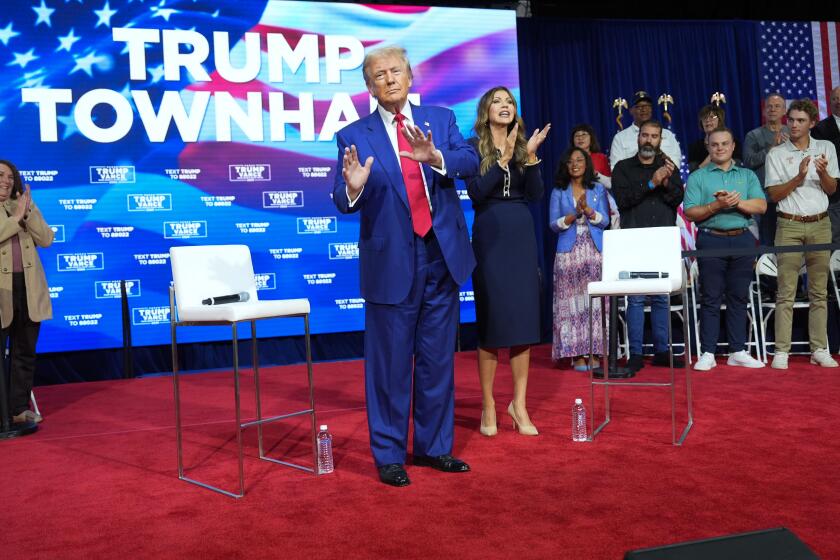Dole’s Push for Health Savings Account Defeated
In an embarrassing defeat for Majority Leader Bob Dole (R-Kan.), the Senate narrowly voted down a proposal Thursday to allow Americans to invest in their own tax-exempt medical savings accounts--a plan that critics charged would benefit only the healthy and wealthy.
The action came as the Senate appeared headed to enact the broadest health care reform legislation in three decades. The bill would make medical coverage “portable,” enabling millions of working Americans to keep their insurance when they change jobs, even if they have preexisting illnesses.
The vote to defeat Dole’s amendment was 52 to 46 and it was a clear disappointment for the majority leader, who is poised to challenge President Clinton for the White House in November. The debate Thursday pitted the two men against one another. Clinton had threatened to veto the Health Insurance Reform Act if it contained the savings account provision.
Final action on the bill was put off until Tuesday when, at 10:45 p.m. EDT, Dole unexpectedly announced that he was delaying the vote so that Sen. Connie Mack (R-Fla.), who left town after his father’s death on Wednesday, could participate.
Dole’s announcement came after a day of long debate and occasionally confusing procedures dealing with a series of amendments put forth by senators wanting to include their pet health care provisions in the bill.
In one surprise vote, the Senate agreed to a proposal by Sens. Pete Domenici (R-N.M.) and Paul Wellstone (D-Minn.) that requires insurance companies to treat mental illnesses the same way claims for physical ailments are handled. Wellstone poignantly dedicated the provision to his brother, who he said has struggled all his life with mental illness.
The medical savings accounts, proposed by Dole and Sen. William V. Roth Jr. (R-Del.) dominated the debate, however. Sen. Edward M. Kennedy (D-Mass.) called the proposal “a poison pill” that could kill the entire bill.
Voting on the amendment dragged on for more than half an hour as Dole struggled to muster support for his plan. In the end, all 47 Senate Democrats were joined by five Republicans in knocking it down. The vote appeared so close that Vice President Al Gore rushed to the Senate chamber to preside over it in case he was needed to break a tie.
Still, the issue is not dead. The House last month adopted its own version of the health care reform bill, and that legislation features medical savings accounts as well as another controversial provision to limit pain and suffering awards in medical malpractice cases to $250,000.
If the Senate approves its bill, as appears likely, the two sides will have to work out these differences and any others. After Thursday’s vote on his amendment, Dole pointedly reminded reporters that he would participate in those negotiations.
Thirteen states are experimenting with medical savings accounts, or MSAs as they are called. They are similar to individual retirement accounts, allowing people to place tax-free dollars into special accounts that could be used for health care spending.
Proponents argue that the accounts are the most portable type of insurance in that they enable anyone--working or not--to at least obtain catastrophic health care coverage. Critics, however, charge that the accounts would draw young healthy people out of traditional insurance pools, thus making it more difficult and expensive for the elderly and sick to obtain coverage.
With the elimination of the medical savings account provision, the health care reform measure cleared its biggest hurdle to passage. Its authors, Kennedy and Sen. Nancy Landon Kassebaum (R-Kan.), had put together an extraordinary bipartisan coalition in favor of the bill. Sixty-six senators co-sponsored it.
But the coalition was fragile and it threatened to break apart several times Thursday as each amendment was offered.
Among those amendments was one offered by Sen. Dan Coats (R-Ind.) and approved by the Senate to provide legal protection to doctors who volunteer their services to the underserved.
But the Senate killed a proposal by Sen. James M. Jeffords (R-Vt.) that would have barred insurance companies from issuing policies with less than a $10-million lifetime cap. That provision had the backing of actor Christopher Reeve, who was paralyzed in a horseback riding accident.
Throughout the day, Kennedy and Kassebaum pleaded with their colleagues not to destroy the underlying portability bill by cluttering it with other provisions. For instance, both the lead sponsors urged their colleagues to vote down the mental health amendment--even though they said they personally favor it.
While the bill is much narrower than the ambitious universal health coverage agenda offered by Clinton in 1994, and also narrower than the version offered by the House, the Senate bill would mark a significant change for millions of working Americans who are locked into jobs for fear that if they leave, they will lose their coverage.
More to Read
Get the L.A. Times Politics newsletter
Deeply reported insights into legislation, politics and policy from Sacramento, Washington and beyond. In your inbox three times per week.
You may occasionally receive promotional content from the Los Angeles Times.










